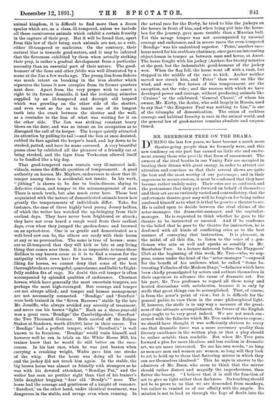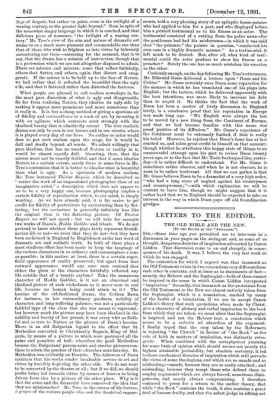MR. BEERBOHM TREE ON THE DRAMA.
DURING the last few years, we have become a much more theatre-going people than we formerly were, and this new tendency on our part has caused no little stir and excite- ment among those who provide that form of amusement. The owners of the rival booths in our Vanity Fair are occupied in beating their drums with great energy, in order to attract our attention and convince us that their several shows are quite the best and the most worthy of our patronage ; and in their eagerness to secure custom, it must be confessed that they have become rather unduly noisy. Their cries are so confused, and the pretensions that they put forward on behalf of themselves and their art are so curiously varied and contradictory, that the unfortunate theatre-goer may well be forgiven for being rather confused himself as to what it is that he goes to a theatre to see. He is called upon to decide between the rival claims of the actor-manager, the dramatist-manager, and the capitalist- manager. He is requested to think whether he goes to the theatre to be instructed or amused. And if he confesses to the belief that he goes to the theatre for instruction, he is deafened with all kinds of conflicting cries as to the best manner of conveying that instruction. It is pleasant, in the midst of all this din, to listen to the voice of a gen- tleman who acts so well and speaks so sensibly as Mr. Beerbohm Tree. In a lecture delivered before the Playgoers' Club at the beginning of this week, Mr. Tree—who, we sup- pose, comes under the head of the "actor-manager "—exposed for the benefit of his audience what he called "Some In- teresting Fallacies of the Modern Stage,"—fallacies which have been chiefly promulgated by actors and authors themselves in their eagerness to advance the cause of dramatic art. For his part, Mr. Tree professes to regard all these noisy and heated discussions with satisfaction, because it is only by strife that great things can be accomplished. That, of course, is from the actor's point of view ; but it is difficult for the general public to view them in the same philosophical light. If, however, the strife is in any way a measure of the great- ness of the ultimate accomplishment, the future of the English stage ought to be very great indeed. We are not much con- cerned with the fallacies which Mr. Tree undertakes to expose ; we should have thought it was sufficiently obvious to every one that dramatic force was a more necessary quality than literary excellence in the written play, or that a play should be rather actable than readable. But when Mr. Tree puts forward a plea for more idealism and less realism in dramatic art, we are more interested. To use his own words, "so long as men are men and women are women, so long will they look to art to hold up to them that flattering mirror in which they can see themselves idealised." This he says in answer to the admirers of Mr. Ibsen, who seem to think that the mirror should rather distort and magnify the imperfections, than flatter the beauty. "I believe that it is still the function of art to give us light rather than darkness. Its teaching should not be to prove to us that we are descended from monkeys, but rather to remind us of our affinity with the angels. Its mission is not to lead us through the fogs of doubt into the fogs of despair, but rather to point, even in the twilight of a waning century, to the greater light beyond." Now, in spite of the somewhat stagey language in which it is couched, and that delicious piece of nonsense, "the twilight of a waning cen- tury," Mr. Tree's view of the aim and nature of dramatic art seems to us a much more pleasant and commendable one than that of those who wish to frighten us into virtue by hideously caricaturing our vices,—assuming for the moment, that is to say, that the drama has a mission of instruction, though that is a pretension which we are not altogether disposed to admit. There are mirrors and mirrors ; some that reflect faithfully, others that flatter, and others, again, that distort and exag- gerate. If the mirror is to be held up to the face of Nature, we had rather that it reflected the beautiful than the ugly ede, and that it flattered rather than distorted the features.
What people are pleased to call realism nowadays, is, for the most part, distortion of what is ugly and disagreeable. So far from realising Nature, they idealise its ugly side by making it appear more prominent and more monstrous than it really is. It is but a cheap method of giving a spurious air of fidelity and vraisemblance to a work of art, by investing it with an ugliness which contrasts most strongly with the idealised beauty that is admittedly unreal. The true realistic drama can only be seen in our houses and in our streets, where it is played every day of our lives. No author or actor would dare to put such realism upon the stage, for it would be dull and deadly beyond all words. We admit willingly that pure idealism, that has no touch of Nature or reality in it, would be almost equally dull. Granting, then, that the mirror must not be exactly faithful, and that it must idealise Nature to a certain extent, surely there is some force in Mr. Tree's contention that it is better to idealise what is beautiful than what is ugly. As a specimen of modern realism, Mr. Tree instanced Therese Raquin, which he described as "rather the work of an impassioned photographer than of an imaginative artist," a description which does not appear to us to be a very happy one, because photography implies a certain fidelity of reproduction which, to our mind, is simply wanting. As we have already said, it is far easier to get credit for fidelity of portraiture by caricaturing than by flat- tering; but the caricature is generally infinitely less like the original than is the flattering picture. Of Therese Raquin, we will not speak ; but we will take for example two works of Ibsen's, Hedda Gabbler and Ghosts. We do not pretend to know whether these plays fairly represent Scandi- navian life or not—we trust that they do not—but they have been acclaimed in England by Englishmen as the last word of dramatic art and realistic truth. In both of these plays a most studious effort has been made to keep the language of the various characters in as ordinary and commonplace a tone as possible; in this matter, at least, there is a certain super- ficial appearance of reality preserved ; but apart from that outward appearance, would any sane man contend that either the plots or the characters faithfully reflected any life outside that of a lunatic asylum ? Take the monstrous character of Hedda Gabbier, is it not an abnormal and idealised picture of such wickedness as is never seen in real life, because no human being could attain to it ? The heroine of the old-fashioned drama, the Colleen Bawn lor instance, in her extraordinary goodness, nobility of -character, and long-suffering patience, was not a particularly faithful type of the class that she was meant to represent ; but however much the picture may have been idealised in the nobility and beauty of her person, it was every whit as faith- ful and as true to Nature as the picture of Ibsen's heroine. There is an old Bulgarian legend to the effect that St. Methodius converted to Christianity Bogaris, King of Bul- garia, by means of a picture in which were portrayed all the pains and penalties of hell : wherefore the good Methodius became the Bulgarians' patron-saint, and similar pictures con- tinue to adorn the porches of their churches unto this day. St. Methodius was evidently an Ibsenite. The followers of Ibsen maintain that his works render invaluable service to art and virtue by horribly depicting the other side. We do not want to be converted by the theatre at all ; but if we did, we should prefer being led towards virtue by scenes of heaven to being driven from vice by a picture of the other place. Why is it that the actor and the dramatist have conceived the idea that they are missionaries? Mr. Tree, in the course of his lecture, ii, propos of the curious people who seek for theatrical engage-
ments, told a very pleasing story of an epileptic house-painter who had applied to him for a part, and who displayed before him a printed testimonial as to his fitness as an actor. The testimonial consisted of a cutting from the police news—for the gentleman had had his misfortunes—in which it was said that "the prisoner," the painter in question, "conducted his own case in a highly dramatic manner." As a testimonial, it left much to be desired. But, after all, what kind of testi- monial could the actor produce to show his fitness as a preacher ? Surely the one has as much mistaken his vocation as the other.
Curiously enough, on the day following Mr. Tree's utterances, Mr. Edmund Gosse delivered a lecture upon "Ibsen and his Critics." Mr. Gosse certainly owes Ibsen some reparation for- the manner in which he has translated one of his plays into- English ; but the lecture, which he delivered apparently with the best intentions, was more likely to increase his debt than to acquit it. He thinks the fact that the work of Ibsen has been a matter of lively discussion in England lately, is a conclusive proof that his reputation in Europe- was made long ago. "We English were always the last to be moved by a new thing from the Continent of Europe,. and that we had become familiar with this name was proof positive of its diffusion." Mr. Gosse's experience of the Continent must be extremely limited, if that is really his belief. However, he rejoices that Ibsen's fame has at last reached us, and takes great credit to himself on that account ; though whether he attributes this happy state of things to an unsuccessful attempt upon his part to review Ibsen twenty years ago, or to the fact that Mr. Toole burlesqued him yester- day—it is rather difficult to understand. For Mr. Gosse is sometimes rather obscure, and when he is not obscure, be is wont to be rather irrelevant. All that we can gather is that Mr. Gosse believes Ibsen to be a dramatist of a very high order,. "who had a long score of neglect against his countrymen and countrywomen ;"—with which explanation we will be content to leave him, though we might suggest that it is rather hard that we in England should be expected to take an interest in the way in which Ibsen pays off old Scandinavian grudges.











































 Previous page
Previous page